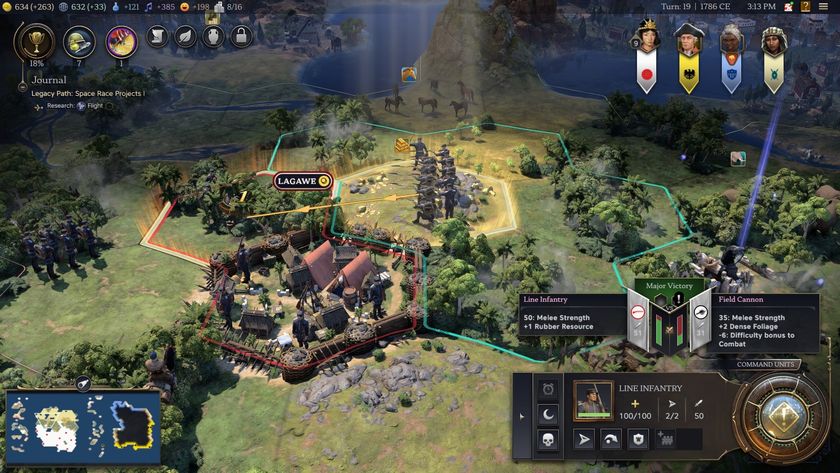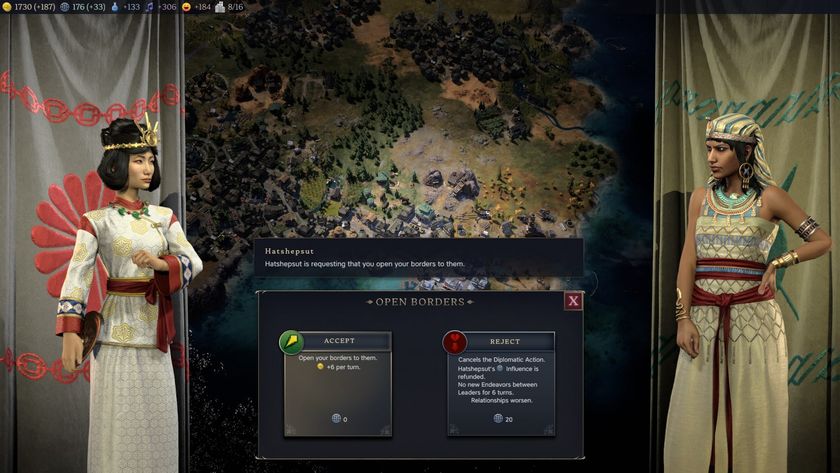From Dust: The best new sandbox game of 2011?
The god game gets a whole new genesis from the creator of Another World

Okay, so that headline is a little misleading, Except that it’s not at all. Allow me to explain.
While From Dust isn’t strictly a sandbox in the sense that gamers have come to understand it – there are very few buildings, certainly no skyscrapers, and a total lack of vehicular combat – in terms of the literal origin of the metaphor, referring to total freedom of expression combined with rafts of emergent gameplay, it’s a killer.
Part Lemmings, part Black & White, part childhood holiday sandcastle simulator, the new XBLA/PSN god game from Eric Chahi, creator of legendary platformer Another World, is already one of the most interesting download games of this year. Want a full report on why? Well good. Because I’ve just prepared one.
Building better worlds
The central conceit of From Dust sees a fantasy-aboriginal tribe lost and disconnected from both its past and the world at large. These people don’t know who they are, where they came from, or what their purpose is. They just know that they must embark on a long journey of self-discovery in order to regain their identity.
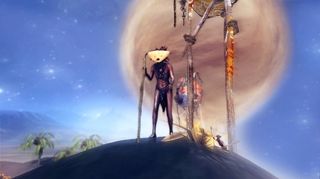
That’s where you come in. Following a tribal ritual at the start of the game, your little masked fellas summon The Breath, an ancient godlike power which guards over them. It manifests itself on screen as a swirling black cursor with an ethereal trail. And that’s you, that is. From hereon in, you'll physically manipulate the very substance of the world around your tribe in order to open their route ahead, allowing them to reach vital objectives, make the best of their growing abilities, and stop them from dying horribly at every turn.
Said horrible drubbings all come by way of a violent and tempestuous natural world. Everything earth, water and lava is set upon stuffing your triberight up, and it’s only by remodelling things to your own will that the little chaps will have any hope of survival. Sound simple? Well it’s not. It’s a whole lot more complicated, and a whole lot more fun than that.
Dirty work
The most basic power you have at your disposal is that of terraforming. A pull of the left trigger will gather earth from any non-rocky ground (up to a large but finite limit) whereas the right trigger will dump it somewhere else. Thus, total freedom over hills, holes, bridges and ridges is yours.
Sign up to the 12DOVE Newsletter
Weekly digests, tales from the communities you love, and more

Path blocked by a lake? Simple. Just grab some earth, pile it up until you’ve made a causeway, then send your little dudes across. But that’s just training wheels stuff. In each level the ultimate goal is to open and pass through a mysterious stone doorway. Unlocking said portal is a case of reaching and capturing the various totems littered around the area, but no two levels operate alike.
Just a couple of levels in you’ll face the threat of immediate wipe-out by way of a tsunami. Touchy subject matter to play through at the moment, for obvious reasons, butI can't blame From Dust's devs for tragic coincidence. With a warning from your Shaman that said water-wall is on the way you’ll find yourself on a frantic race against a three-minute timer to get someone across several islands and past a torrential river in order to reach a mountainside totem which holds the power to repel water. Then you’ll have to get him back in time to transfer that power to the village and deflect the incoming wave.
It’s a tight challenge in itself, but then consider this: From Dust’s world-simulation is a completely holistic, organic depiction of the elements, in which everything is persistently having an effect on everything else.
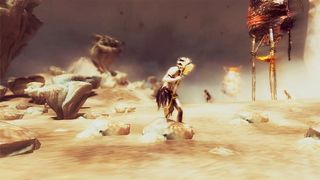
That dam you built to get your hero across the river might have been eroded away by the time you make the return journey. Or it might have been so effective as to redirect the whole river along a completely different path, potentially sending it barrelling towards your village or another vital totem, causing a whole load of knock-on problems.
The dam might fall apart, as it did for me, just as your noble quest-taker is crossing it, dropping him into the river and immediately churning him out to sea. But then you’ll realise that you can scoop up water just as easily as earth. Grab the bit of sea he’s floating in as he’s swept close to the shore and you’ll scoop it out from around him, potentially managing to beach him on a beach that never existed before. Until the rest of the sea catches up, anyway.
The sense of having a real, physical, tactile affect on the world becomes rather intoxicating with a little exploration. With further exploration? From Dust becomes insanely compulsive.
Elements of power
As you progress further along your tribe’s journey you’ll discover new elements to help and hinder, and new powers to harness. One of the coolest is the ability to jellify water, turning it briefly into a malleable mass that can be sculpted. Your tribe needs to cross a channel? No time to build a bridge? Just go Moses on it, but be careful of the transient nature of the affect.
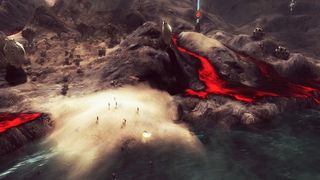
Nearby volcano giving you problems? There are a few ways around that. You could heap up earth to redirect the lava flow. Or maybe you’d prefer to scoop up the lava itself and dump it elsewhere (drop it into water and it’ll solidify into rock, creating more permanent constructions). Or you could jellify some water and pile it up in the path of the lava to create an instantly cooling barrier, in turn creating a solid rock barrier to help matters further.
From Dust is all about using improvised thinking to get the best out of the available environment. Any hazard can be turned into a help with a bit of lateral planning. A later level tasked the tribe with reaching a totem at the foot a mountain range. No obvious hazards along the way, but another ominous timer was present, with a much tighter limit. Every time it hit zero, a huge incoming tide hit the other side of the mountains, pouring down through the gaps between the rock. Suddenly lava was a friend, a sort of quick-drying cement with which to block the gaps and make a solid wall of rock to keep the little chaps dry along their journey.
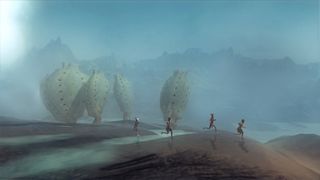
Conversely, water can be a help. The devs told me that they’re still being surprised by new ways players discover to manipulate From Dust’s world, citing manipulation of river flows to create quick-travel slides with which to rapidly transport the tribe from one end of a map to the other. Using this stuff to complete levels though, is just the start.
Free play
Any completed level can be revisited at any time. The reason? Good old fashioned dicking about. With so much extra emergent gameplay available outside of completing the core objectives, From Dust’s team felt it would be a waste of potential to not let players completely explore it.
With nothing in particular to do, it’s amazing how much you’ll find to do. You can reshape hillsides, create new lakes, reroute rivers, create new islands and lakes, or just experiment with From Dust’s emergent physics to see what will happen. It might not sound too exciting, but this stuffisutterly entrancingonce you get an idea and set about seeing if you can make it work.
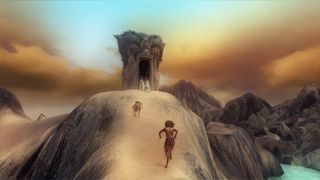
By the time I’d finished combining waterfalls, diverting river flows, flooding plains and draining water levels to create new deltas, one of the devs admitted he didn’t even recognise which map I was playing on any more. And the best bit of this freedom to remake the game in your own image? Your rebuilt terrain will remain as you made it when you switch off.
And then there’s also the schadenfreude experimentation of seeing how many contrived and creative ways you can wipe out your tribe, which gets devilishly interesting once they’ve earned a few latent anti-elemental powers with which to combat your best efforts against them. I was both displeased and mighty proud of them when they diverted my mighty flood using the anti-tsunami power I’d taught them earlier. Clever, pluckylittle sods. You’ll grow quite attached to them. Highly protective, in fact, as the game progresses.
Won’t stop you trying to decimate them after every level though.
March 16th, 2011
While From Dust isn’t strictly a sandbox in the sense that gamers have come to understand it – there are very few buildings, certainly no skyscrapers, and a total lack of vehicular combat – in terms of the literal origin of the metaphor, referring to total freedom of expression combined with rafts of emergent gameplay, it’s a killer.
Part Lemmings, part Black & White, part childhood holiday sandcastle simulator, the new XBLA/PSN god game from Eric Chahi, creator of legendary platformer Another World, is already one of the most interesting download games of this year. Want a full report on why? Well good. Because I’ve just prepared one.
Building better worlds
The central conceit of From Dust sees a fantasy-aboriginal tribe lost and disconnected from both its past and the world at large. These people don’t know who they are, where they came from, or what their purpose is. They just know that they must embark on a long journey of self-discovery in order to regain their identity.

That’s where you come in. Following a tribal ritual at the start of the game, your little masked fellas summon The Breath, an ancient godlike power which guards over them. It manifests itself on screen as a swirling black cursor with an ethereal trail. And that’s you, that is. From hereon in, you'll physically manipulate the very substance of the world around your tribe in order to open their route ahead, allowing them to reach vital objectives, make the best of their growing abilities, and stop them from dying horribly at every turn.
Said horrible drubbings all come by way of a violent and tempestuous natural world. Everything earth, water and lava is set upon stuffing your triberight up, and it’s only by remodelling things to your own will that the little chaps will have any hope of survival. Sound simple? Well it’s not. It’s a whole lot more complicated, and a whole lot more fun than that.
Dirty work
The most basic power you have at your disposal is that of terraforming. A pull of the left trigger will gather earth from any non-rocky ground (up to a large but finite limit) whereas the right trigger will dump it somewhere else. Thus, total freedom over hills, holes, bridges and ridges is yours.

Path blocked by a lake? Simple. Just grab some earth, pile it up until you’ve made a causeway, then send your little dudes across. But that’s just training wheels stuff. In each level the ultimate goal is to open and pass through a mysterious stone doorway. Unlocking said portal is a case of reaching and capturing the various totems littered around the area, but no two levels operate alike.
Just a couple of levels in you’ll face the threat of immediate wipe-out by way of a tsunami. Touchy subject matter to play through at the moment, for obvious reasons, butI can't blame From Dust's devs for tragic coincidence. With a warning from your Shaman that said water-wall is on the way you’ll find yourself on a frantic race against a three-minute timer to get someone across several islands and past a torrential river in order to reach a mountainside totem which holds the power to repel water. Then you’ll have to get him back in time to transfer that power to the village and deflect the incoming wave.
It’s a tight challenge in itself, but then consider this: From Dust’s world-simulation is a completely holistic, organic depiction of the elements, in which everything is persistently having an effect on everything else.

That dam you built to get your hero across the river might have been eroded away by the time you make the return journey. Or it might have been so effective as to redirect the whole river along a completely different path, potentially sending it barrelling towards your village or another vital totem, causing a whole load of knock-on problems.
The dam might fall apart, as it did for me, just as your noble quest-taker is crossing it, dropping him into the river and immediately churning him out to sea. But then you’ll realise that you can scoop up water just as easily as earth. Grab the bit of sea he’s floating in as he’s swept close to the shore and you’ll scoop it out from around him, potentially managing to beach him on a beach that never existed before. Until the rest of the sea catches up, anyway.
The sense of having a real, physical, tactile affect on the world becomes rather intoxicating with a little exploration. With further exploration? From Dust becomes insanely compulsive.
Elements of power
As you progress further along your tribe’s journey you’ll discover new elements to help and hinder, and new powers to harness. One of the coolest is the ability to jellify water, turning it briefly into a malleable mass that can be sculpted. Your tribe needs to cross a channel? No time to build a bridge? Just go Moses on it, but be careful of the transient nature of the affect.

Nearby volcano giving you problems? There are a few ways around that. You could heap up earth to redirect the lava flow. Or maybe you’d prefer to scoop up the lava itself and dump it elsewhere (drop it into water and it’ll solidify into rock, creating more permanent constructions). Or you could jellify some water and pile it up in the path of the lava to create an instantly cooling barrier, in turn creating a solid rock barrier to help matters further.
From Dust is all about using improvised thinking to get the best out of the available environment. Any hazard can be turned into a help with a bit of lateral planning. A later level tasked the tribe with reaching a totem at the foot a mountain range. No obvious hazards along the way, but another ominous timer was present, with a much tighter limit. Every time it hit zero, a huge incoming tide hit the other side of the mountains, pouring down through the gaps between the rock. Suddenly lava was a friend, a sort of quick-drying cement with which to block the gaps and make a solid wall of rock to keep the little chaps dry along their journey.

Conversely, water can be a help. The devs told me that they’re still being surprised by new ways players discover to manipulate From Dust’s world, citing manipulation of river flows to create quick-travel slides with which to rapidly transport the tribe from one end of a map to the other. Using this stuff to complete levels though, is just the start.
Free play
Any completed level can be revisited at any time. The reason? Good old fashioned dicking about. With so much extra emergent gameplay available outside of completing the core objectives, From Dust’s team felt it would be a waste of potential to not let players completely explore it.
With nothing in particular to do, it’s amazing how much you’ll find to do. You can reshape hillsides, create new lakes, reroute rivers, create new islands and lakes, or just experiment with From Dust’s emergent physics to see what will happen. It might not sound too exciting, but this stuffisutterly entrancingonce you get an idea and set about seeing if you can make it work.

By the time I’d finished combining waterfalls, diverting river flows, flooding plains and draining water levels to create new deltas, one of the devs admitted he didn’t even recognise which map I was playing on any more. And the best bit of this freedom to remake the game in your own image? Your rebuilt terrain will remain as you made it when you switch off.
And then there’s also the schadenfreude experimentation of seeing how many contrived and creative ways you can wipe out your tribe, which gets devilishly interesting once they’ve earned a few latent anti-elemental powers with which to combat your best efforts against them. I was both displeased and mighty proud of them when they diverted my mighty flood using the anti-tsunami power I’d taught them earlier. Clever, pluckylittle sods. You’ll grow quite attached to them. Highly protective, in fact, as the game progresses.
Won’t stop you trying to decimate them after every level though.
March 16th, 2011
Most Popular





